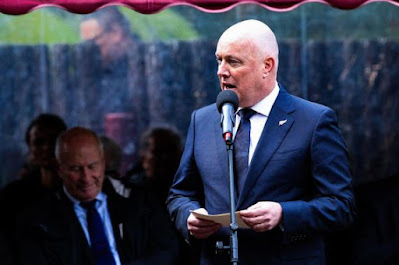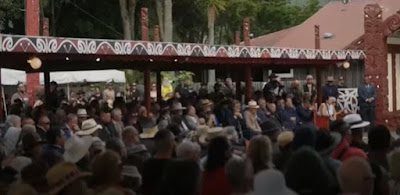 |
| Emotional Response: Prime Minister Christopher Luxon addresses mourners at the tangi of King Tuheitia on Turangawaewae Marae on Saturday, 31 August 2024. |
THE DEATH OF KING TUHEITIA could hardly have come at a worse time for Maoridom. The power of the Kingitanga to unify te iwi Māori was demonstrated powerfully at January’s national hui, where upwards of 10,000 people answered King Tuheitia’s summons to the Turangawaewae marae. But now, at this fractious historical hour, the power of the Kingitanga is passing into untested hands.
If the traditional “kingmakers” of the royalist iwi choose unwisely, then the divisions and tensions between Tangata Whenua and Tangata Tiriti may widen further. In the weeks and months that lie ahead, rash and angry words from King Tuheitia’s successor have the potential to ignite a political conflagration. In these circumstances, Māori and Pakeha have an equally pressing need for the Kotahitanga [Unity] that was the late King’s guiding star.
This need for unity was expressed with affecting sincerity at the King’s tangi by someone many New Zealanders would regard as its most unlikely champion. As the leader of the conservative coalition government responsible for sharpening the points of Māori-Pakeha difference, Christopher Luxon’s participation in the King’s funeral ceremonies could easily have been construed as perfunctory, or, even worse, provocative. That he spoke of his relationship with the King with such obvious emotion, his voice close to breaking, unquestionably impressed his Tainui hosts. That said, the thought surely crossed their minds: “What is it with this Pakeha, who weeps with us, even as his ministers assault us?”
What indeed? The most obvious answer is that Luxon, like all politicians, is a complex mixture of emotion and calculation; sincerity and subterfuge. What’s more, though reason reels from the thought, Luxon, like many politicians, can be both at the same time. Very few Pakeha New Zealanders are immune to the extraordinary, almost magical, power which Maoridom is able to summon at moments of great historical significance. It brings our emotions suddenly, and often unexpectedly, to the surface, catching us off-guard.
This blending of the spiritual with the material was a skill which, until relatively recently, was manifest in all cultures. Those over the age of 70 will recall the state funeral of the slain President, John F. Kennedy: the soldiers slow-marching with arms reversed; the riderless horse, its master’s boots facing backwards; and that unforgettable image, almost unbearably poignant, of Kennedy’s young son innocently snapping his father a filial salute as the funeral cortege passed by.
Symbols, and the powerful feelings they evoke, were much more available to Westerners sixty years ago. New Zealand, now one of the world’s most secular societies, was then an emphatically Christian nation. Pakeha religiosity was strong in the 1950s and 60s, and, come Sunday morning, most of the nation’s churches were full. Back then, the spiritual world and the material world overlaid each other and intermingled in ways that today’s secular Pakeha would struggle to accept.
But not today’s Māori. In te Ao Māori the spiritual infuses the material in ways that at once entrance and confuse Pakeha. A cynic might say that this spirituality, this affinity for the metaphysical, is Maoridom’s secret weapon, and that Christopher Luxon is as susceptible to its magic as any number of his equally entranced compatriots.
Why, then, does he not take advantage of it? Why impress Tainui and the Kingitanga with your tears, and then return to a Parliament where Act and NZ First continue to drag the National Party down the path of “pernicious polarisation?
Typically, “pernicious polarisation” is initiated by political elites that have been electorally sidelined and are willing to do almost anything to get back in the game. They deliberately stoke class, racial and/or religious divisions – often in cahoots with more extreme groups. Their hope is to extend their electoral reach by advancing under the cover of their new allies’ more inflammatory political rhetoric, and by quietly promising to introduce at least some of the extremists’ most radical policies as soon as power has been reclaimed.
Clearly, the National Party, alongside Act and NZ First, has been drawing heavily from the pernicious polarisers’ playbook. Equally clearly, it has worked: National has reclaimed the Treasury Benches and is sitting pretty as the dominant party within a conservative coalition government.
National’s problem, now, is that, having been assisted into office by its more extreme coalition partners, it is required to deliver on the promises made to get them (and keep them) onside. Since these commitments are mostly bound up with Act’s and NZ First’s determination to rein-in what both parties believe to be an over-mighty Maoridom, New Zealand’s politics risk becoming convulsed to a degree not seen since the 1981 Springbok Tour.
Such convulsions are most unlikely to spare the National Party. Its record on race-relations is a proud one, and trashing it to keep David Seymour and Winston Peters happy is not a course of action a significant number of National Party MPs and members are likely to accept with equanimity. Indeed, the louder the chorus of protest from Māori and progressive Pakeha New Zealanders grows, the more misgivings National is likely to experience.
There will be some in the party who look to National’s past and argue that civil unrest has always been the Right’s friend. Certainly, National romped back into office after the 1951 Waterfront Dispute, and Rob Muldoon’s facilitation of the 1981 Springbok Tour saw National returned (narrowly) to power. But, the past is not always prelude, sometimes it represents an end, not a beginning.
With the King’s tangi as a backdrop, Christopher Luxon could earn considerable praise from across the country if he was to announce that, as a coronation gift, he was giving the new Māori monarch his solemn promise that the National Party would not allow Act’s Treaty Principles Bill to reach the floor of Parliament.
Would David Seymour respond by breaking up the Coalition? Quite possibly. Luxon should let him. National still has plenty of money. Labour, the Greens and Te Pāti Maori are in no position to mount a credible threat to National’s re-election chances. Indeed, the parties of the Left would be hard-pressed not to cheer Luxon on!
Moreover, if National categorically ruled out entering into another coalition with Act and NZ First, and Luxon, taking inspiration from Kamala Harris’ playbook, declared it time to “turn the page” on the politics of racial division, then he and his party would likely be rewarded with a runaway electoral victory. Kiwis don’t like political confrontation at the best of times – especially not with their own friends and whanau.
Kotahitanga, in addition to being King Tuheitia’s guiding star, could very successfully double as National’s campaign slogan.
This essay was originally posted on the Interest.co.nz website on Monday, 2 September 2024.




